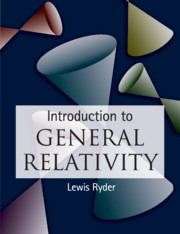Book contents
- Frontmatter
- Contents
- Preface
- Notation, important formulae and physical constants
- 1 Introduction
- 2 Special Relativity, non-inertial effects and electromagnetism
- 3 Differential geometry I: vectors, differential forms and absolute differentiation
- 4 Differential geometry II: geodesics and curvature
- 5 Einstein field equations, the Schwarzschild solution and experimental tests of General Relativity
- 6 Gravitomagnetic effects: gyroscopes and clocks
- 7 Gravitational collapse and black holes
- 8 Action principle, conservation laws and the Cauchy problem
- 9 Gravitational radiation
- 10 Cosmology
- 11 Gravitation and field theory
- References
- Index
8 - Action principle, conservation laws and the Cauchy problem
Published online by Cambridge University Press: 05 June 2012
- Frontmatter
- Contents
- Preface
- Notation, important formulae and physical constants
- 1 Introduction
- 2 Special Relativity, non-inertial effects and electromagnetism
- 3 Differential geometry I: vectors, differential forms and absolute differentiation
- 4 Differential geometry II: geodesics and curvature
- 5 Einstein field equations, the Schwarzschild solution and experimental tests of General Relativity
- 6 Gravitomagnetic effects: gyroscopes and clocks
- 7 Gravitational collapse and black holes
- 8 Action principle, conservation laws and the Cauchy problem
- 9 Gravitational radiation
- 10 Cosmology
- 11 Gravitation and field theory
- References
- Index
Summary
If we take seriously – as of course we must – the notion that Einstein's theory of gravity has a status equal in validity to that of other major theories of physics, for example Maxwell's electrodynamics or the more modern gauge field theories of particle physics, then we shall want to ask how General Relativity may be formulated at a fundamental level. In Chapter 5 the field equations were introduced on a more or less ad hoc basis, arguing that what was wanted were equations relating space-time curvature to the energy and momentum of the source, that they should therefore involve second rank tensors; and that the equations also reduced to Newton's law in the non-relativistic limit. This approach is fine as far as it goes, but recall that Maxwell's equations, for example, may be derived from a principle of least action; a Lagrangian formulation. May Einstein's equations also be derived from a Lagrangian formulation? Indeed they may, and this is the subject of the first part of this chapter. We go on to investigate the tricky topic of conservation laws in General Relativity, a subject which has complications resulting from the fact that the (matter) energy-momentum tensor is covariantly conserved, whereas ‘true’ conservation laws involve simply partial, rather than covariant, differentiation. The chapter finishes with a consideration of the Cauchy, or initial value, problem. Einstein's field equations are second order differential equations, whose solutions will therefore involve specifying ‘initial data’ on a spacelike hypersurface.
Information
- Type
- Chapter
- Information
- Introduction to General Relativity , pp. 295 - 309Publisher: Cambridge University PressPrint publication year: 2009
